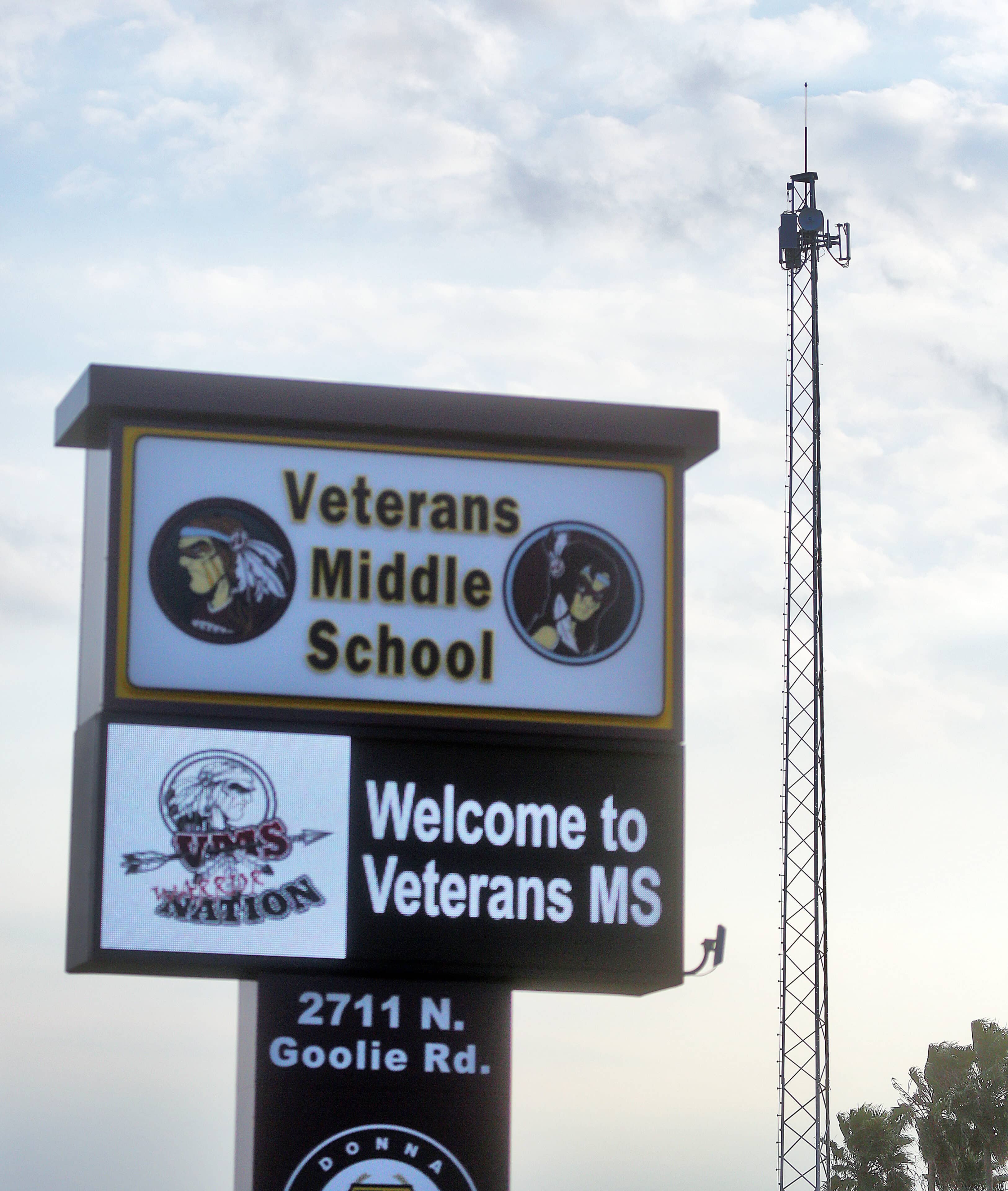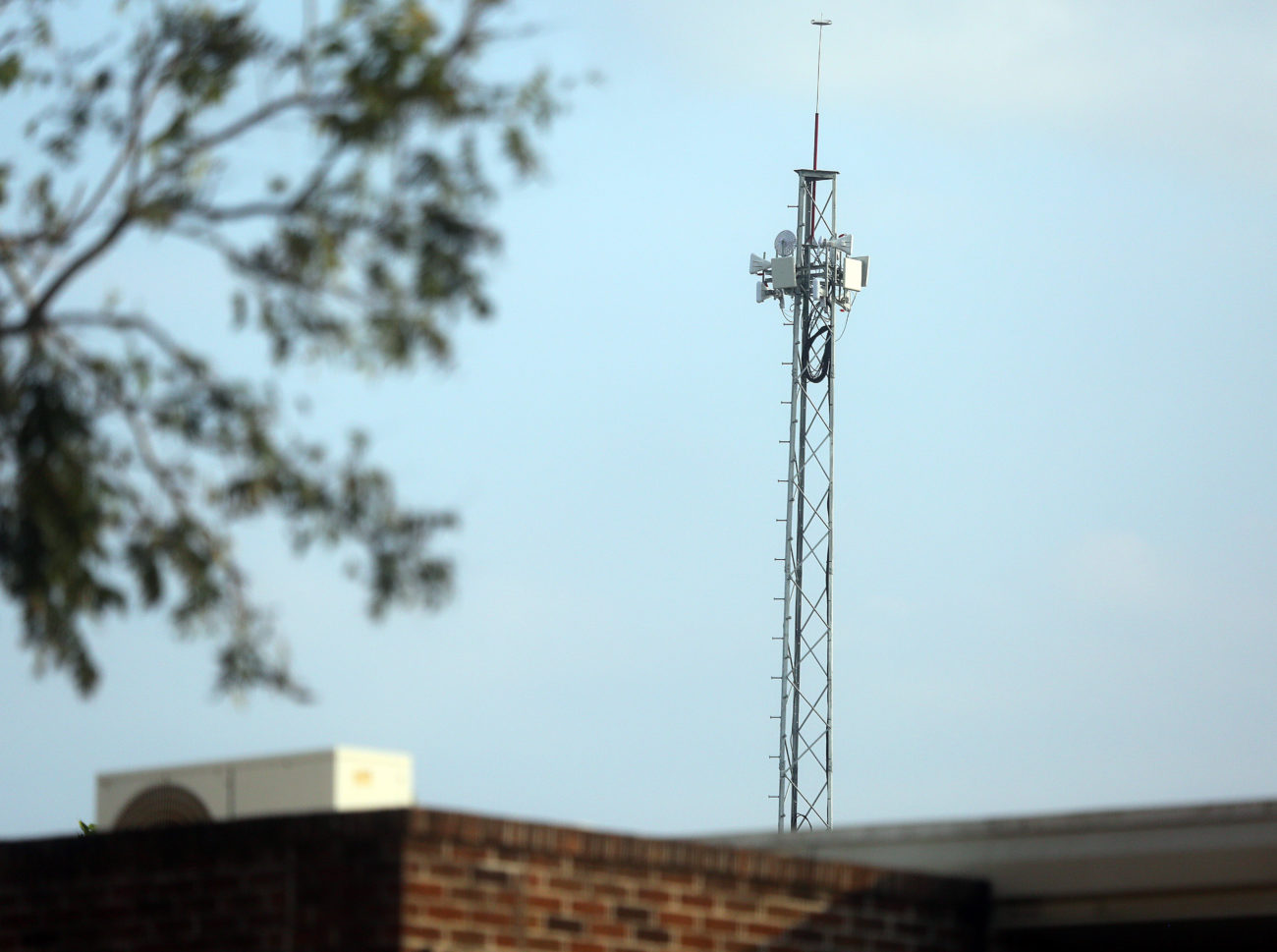Several board trustees at the Donna Independent School District are growing increasingly frustrated with delays to its $3.7 Wi-Fi tower project, the cornerstone piece of the district’s effort to get internet to a community where half of the students report poor or no access.
The tower project was originally slated to be completed in November of last year and expected to provide internet to 8,000 to 10,000 students, about two thirds of the district’s enrollment.
Beset by pandemic supply problems and high water levels at installation sites, the last of the dozen towers was only installed in February.
Despite all the towers being erected, only 800-odd students were using internet provided through them at the board’s last update on the project on March 9.
Information from the district suggests the majority of the district’s students have found some way to connect, using hot spots, the towers or their own internet. Data shows that in the first week of this month, an average of 9,348 of the Chromebooks distributed by the district were active and online.
WIFIRUS, the Edinburg company the district contracted with to install the Wi-Fi infrastructure, has faced sharp criticism for the delays and for how few students have benefited from the project so far.
Trustees in February even floated the idea of taking legal action if the twelfth tower wasn’t installed by March.
“We went above and beyond, publicized it that we were gonna get all these towers, and you know, I’ve had complaints from citizens every day. When I go to H-E-B, that’s all I hear,” freshman Trustee Jose R. Reyna said. “The individuals, the parents that live across the street from Sauceda, the first street they pickup Wi-Fi; the second block doesn’t get anything. It’s ridiculous. I mean, $3.8 (sic) million? Someone needs to be held accountable.”
Trustees didn’t threaten legal action at last week’s meeting, but they did express their frustration with how the project has turned out and asked for a board workshop to be held within two weeks specifically to discuss it.
“Every time we come to a meeting, there’s an excuse after excuse after excuse,” Trustee David De Los Rios said. “I would like for us to have a workshop with everybody present with the social distancing, and get to the bottom of this matter.”
That discussion will almost certainly revolve around a piece of equipment called repeaters.
According to WIFIRUS representative Gilberto De Los Santos, more repeaters are needed to provide internet from the towers to more students. He told the board a little over 7,000 students could benefit from the towers immediately if those repeaters were available.

The original plan for the tower project called for 715 of those repeaters to be installed, De Los Santos said. He claims all but 100 of the repeaters were eliminated from the plan in a cost saving effort that tightened the budget on the project by a couple hundred thousand dollars.
“It was anticipated that there would be more phases, and the next phase would be if they could restore those repeaters,” De Los Santos said in an interview Thursday. “That would go a real long ways. And it’s their decision whether they want to go further or not.”
Whatever the board decides what to do about the repeater shortage, De Los Santos says the system will likely need some tinkering — there may even need to be a phase three for the project with an additional two or three towers if the district wants to effectively cover its entire area.
Even when the towers are operating perfectly and the repeaters are installed, De Los Santos says the district won’t see all of its students switch over to internet from the towers overnight. Some have Wi-Fi already and won’t drop it to switch over immediately. Others are currently relying on the 2,000-plus hot spots the district distributed during the pandemic.
The number of students using Wi-Fi from the towers will go up gradually, De Los Santos said. And it has gone up. The number of users more than doubled from the beginning of February to the beginning of March, going from 328 to 795.
“As far as connectivity to the Donna network, it’s gonna take time,” De Los Santos said. “It’s gonna take time, and this is where the district has to do their work to sell the project.”
Time is precisely what several trustees are saying they don’t have.
“Think again, $3.7 million,” Trustee Fernando Castillo said. “And for us to still say that we’re still having issues? I think it’s just something that’s unacceptable and as board members, we’re elected to try to be the voice of our community. And something like this is directly impacting our kids when it comes to the virtual learning.”
Speaking Thursday, De Los Santos expressed his disappointment at how communications between WIFIRUS and the board have deteriorated, but said he was confident that the proposed workshop would put his company and the district back on the same page.
“I really feel that the board needs to be much better informed of what we are actually doing, and if they feel like there are certain areas that haven’t been met, we need to know,” he said. “But they need to have firsthand knowledge of what we’re doing. You know, the board has three new board members that actually weren’t there when the project was planned and when the project was awarded. And those are the most vocal.”
As delays have dragged on De Los Santos has increasingly faced questions from the board about his company’s capability to complete a project the size of the district’s and about the quality of its work.
De Los Santos defended WIFIRUS’ competency and capability to handle the project. Although the company is only four years old, De Los Santos said that it’s a product of a merger with a much older company out of Mexico that has a deep field of highly qualified engineers and has performed significantly sized projects on the other side of the border.
Although WIFIRUS has other Rio Grande Valley clients, their largest American project so far is an ongoing $1.4 million eight-tower public-private partnership with the city of Alton. Although the city of Alton’s Development Corporation CEO Steve Peña noted that the specifics of that project differ significantly from WIFIRUS’ Donna project, he said Alton’s experience with WIFIRUS has been very positive and the project has largely been viewed as a success.
“It worked out fine for us and we’re still working with them,” he said.




